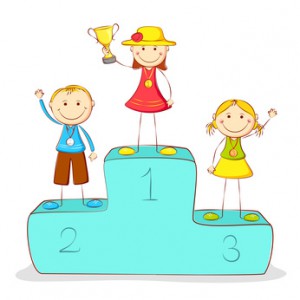Brain Waves, Toddlers, & Moral Development
All parents want to raise children with a strong sense of right and wrong. However, most parents don’t realize how early—surprisingly early—this moral behavior and thought begins.  Jean Decety from the University of Chicago (and his associate, Jason Cowell) demonstrated that parents influence their children’s moral development as early as one year old! He showed a group of 73 toddlers (12-24 months old) two types of animated videos: one in which characters engaged in helping and sharing or one in which characters exhibited pushing, tripping, and shoving behavior. At the same time, they measured the toddlers’ eye movement (gaze) and brain waves. Afterwards, the researchers offered the toddlers a choice of two toys: one representing the “good” animated character or one representing the “bad” character.
Jean Decety from the University of Chicago (and his associate, Jason Cowell) demonstrated that parents influence their children’s moral development as early as one year old! He showed a group of 73 toddlers (12-24 months old) two types of animated videos: one in which characters engaged in helping and sharing or one in which characters exhibited pushing, tripping, and shoving behavior. At the same time, they measured the toddlers’ eye movement (gaze) and brain waves. Afterwards, the researchers offered the toddlers a choice of two toys: one representing the “good” animated character or one representing the “bad” character.
What did they discover? First, toddlers looked at and tracked the “good,” pro-social characters longer. They showed more interest in the characters who exhibited positive moral actions. In addition, toddlers experienced different brain wave patterns when witnessing the prosocial behavior and the antisocial behavior. But, these differences did not impact which toy the toddler chose. There was one factor that differentiated which toy the child reached for, regardless of the length of their gaze at the “good” character or the difference in the brain wave patterns associated with the prosocial/antisocial behavior. An additional distinct brain wave pattern was associated with which toy was chosen. This additional brain wave occurred just after the toddler witnessed the behavior of the animated character and it differentiated which toy the child chose.
Now for the really interesting part! The researchers discovered what may have contributed to that distinct brain wave pattern after reviewing questionnaires completed by parents prior to the research. These questionnaires measured parental values around empathy, justice, and fairness as well as their child’s temperament and demographics. Parental sensitivity to justice distinguished toddlers’ who reached for the “good character” toy from those who reached for the “bad character” toy! In other words, the parents’ values around justice impacted how their children’s brains work and whether their 12-24 month old reached out for the prosocial or antisocial character.
The researchers also gave the toddlers opportunities to share their toys in this experiment. This time, the parents’ ability to take someone else’s perspective influenced their children’s willingness to share, even at 12-24 months of age! So, if you want to raise children with a strong sense of right and wrong, children sensitive to justice, and children willing to share, begin early by:
- Cultivating your own sense of justice. Discipline fairly. Do not practice the “Do as I say not as I do” mentality. Instead, set the example of living and accept the just consequences for your behavior. Apologize and ask forgiveness when you make a mistake. Give just rewards for appropriate behavior (which can be as simple as a polite “thankyou” or “I appreciate your help.”). Talk about justice in the community. Read stories together that reveal justice. Cultivate justice in your life.
- Practice taking other people’s perspective before reacting to them. Put yourself in your spouse’s shoes, your children’s shoes, your neighbors’ shoes and consider the situation from their perspective. Think and talk about the perspective the store clerk, the police officers, or the teacher.
These simple practices will help you raise moral children…and help create a more moral world for your grandchildren.
-0 Comment-